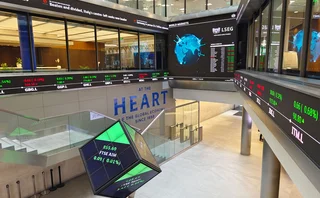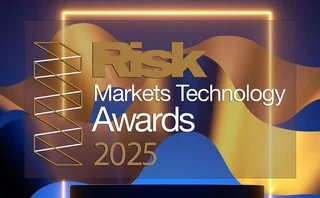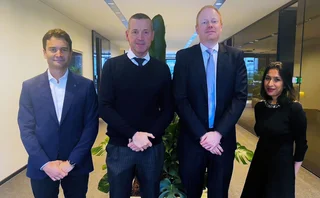
Risk Awards 2018: The winners
Morgan Stanley takes top derivatives prize; lifetime award for Xavier Rolet; Citi lands risk management award

Scroll down for links to all the winners.
It feels a bit like a haunting. Volatility is gone, but its absence now looms over everything – asset managers are changing their mandates, banks their business mix, researchers their subject matter.
This plays to some firms’ strengths. With flow businesses struggling, all dealers are trying to identify and unlock hard-to-access opportunities for their clients. Morgan Stanley did so repeatedly in inflation and rates, helping the bank gain almost two percentage points of fixed-income market share in a year when global revenues have been shrinking.
“When comparing the size of our balance sheet to one of the larger American or European banks, we’re clearly at a disadvantage if we try to compete on flow business alone,” says Sam Kellie-Smith, the bank’s global head of fixed income. “The ability to manage more exotic risk, decompose it and make it more plain-vanilla is what differentiates our firm from the competition.”
One of its hits was to turn Taiwanese appetite for locally issued US dollar debt – known as Formosa bonds – into opportunities for European and US investors. The flows associated with the Formosa business allowed clients to buy forward US dollar rates volatility cheaply and, separately, to profit from the typical hedging mismatch run by dealers in the business.
In credit derivatives, the search for yield has driven traditional asset managers into a market that used to be dominated by hedge funds – prompting Goldman Sachs to cook up new products. Some jumbo deals have followed, including the bank’s biggest credit volatility trade to date.
In foreign exchange, meanwhile, Deutsche Bank has started sounding more like a technology vendor than a market-maker – part of a strategic pivot to develop businesses beyond pure execution.
“The ability to provide prices is becoming ubiquitous across the market, and so the difference in a lot of areas between best price and tenth best price is often not very much. That is certainly the case compared to being able to give people additional services that potentially reduce their operational risk or increase their efficiency in some way,” says Jonathan Tinker, co-head of forex at Deutsche Bank.
The pivot was underway before volatility vanished, but has become increasingly relevant in these weirdly monotone markets.
On the buy-side, the absence of volatility can be seen in the search for new sources of efficiency. Suddenly, every basis point counts.
At Man AHL, the investment manager’s quant investing arm, an exciting new algorithm was put to work this year, but not to deliver some previously untapped source of return. Instead, the order router decides how best to execute trades as market conditions change – choosing from an array of proprietary and third-party execution algos, as well as human traders. In theory, it will help the firm pocket huge numbers of tiny savings.
“The order router isn’t classic alpha. But it potentially has as much impact for our clients as any of our trading systems,” says Matthew Sargaison, AHL’s co-chief executive.
Our buy-side quant of the year – a rare back-to-back win by Capital Fund Management’s Jean-Philippe Bouchaud – landed the prize with a paper looking at the neglected topic of cross-impact, the shift in price a trade produces in correlated instruments.
“People look at market impact for individual assets but not for multiple assets at the same time. They simply ignore the problem and say ‘If I buy a lot of Amazon stocks and then try to buy Google stocks, it’s not going to have an impact’, but that’s definitely not true,” says one fan of Bouchaud’s work.
Leaving volatility behind, this year’s lifetime achievement award goes to Xavier Rolet, the former chief executive of London Stock Exchange Group (LSEG), who stepped down abruptly on November 29. He leaves behind an institution transformed by his deal-making prowess and strong convictions about the exchange business – but also one facing the potential trauma of Brexit and challenges to Rolet’s prized open-access philosophy.
Ultimately, Rolet says, customers will ensure open access wins: “If you bundle all your services, access to your IP, your indexes, clearing, your trading, your settlement, in a single product, for which of course you charge a bundled fee, and don’t give choice to your customers, they do not like that model,” he says.
In his interview, Rolet talks about the failed merger with Deutsche Boerse, the EU’s threats to lay claim to euro-denominated clearing, and reveals why he was convinced that buying LCH would work.
Elsewhere, Citi wins bank risk manager of the year for its management of counterparty and currency exposures when providing large amounts of US dollar funding to Nigeria’s banks.
And a trio of quants – Leif Andersen, Michael Pykhtin and Alexander Sokol – win the quant of the year award for revealing the scale of the settlement risks that can lurk even when derivatives are covered by initial margin.
As always, picking the winners was extremely difficult. Risk asked candidates to submit detailed information on their businesses, and shortlisted firms were interviewed off the record. Risk then gathered feedback from clients and other market participants.
The final decisions were made by Risk’s editors and journalists, weighing a number of factors, including risk management, creativity and innovation, liquidity provision, quality of service and customer satisfaction, and engagement with regulatory issues.
Where decisions were tight, client feedback often helped settle the issue. The Risk editorial team thanks all this year’s participants for their time and help.
The profiles of our winners can be found below.
Interest rate derivatives house of the year
Currency derivatives house of the year
Equity derivatives house of the year
Credit derivatives house of the year
Inflation derivatives house of the year
Structured products house of the year
Risk solutions house of the year
Rates flow market-maker of the year
Currencies flow market-maker of the year
Equities flow market-maker of the year
Streaming liquidity provider of the year
Credit portfolio manager of the year
Exchange innovation of the year
Asset manager of the year, risk management
Sovereign risk manager of the year
Asset manager, systematic investing
Institutional investment product of the year
Retail investment product of the year
Quant research team of the year
OTC client clearer of the year
OTC trading platform of the year
Trading platform innovation of the year
Only users who have a paid subscription or are part of a corporate subscription are able to print or copy content.
To access these options, along with all other subscription benefits, please contact info@risk.net or view our subscription options here: http://subscriptions.risk.net/subscribe
You are currently unable to print this content. Please contact info@risk.net to find out more.
You are currently unable to copy this content. Please contact info@risk.net to find out more.
Copyright Infopro Digital Limited. All rights reserved.
As outlined in our terms and conditions, https://www.infopro-digital.com/terms-and-conditions/subscriptions/ (point 2.4), printing is limited to a single copy.
If you would like to purchase additional rights please email info@risk.net
Copyright Infopro Digital Limited. All rights reserved.
You may share this content using our article tools. As outlined in our terms and conditions, https://www.infopro-digital.com/terms-and-conditions/subscriptions/ (clause 2.4), an Authorised User may only make one copy of the materials for their own personal use. You must also comply with the restrictions in clause 2.5.
If you would like to purchase additional rights please email info@risk.net
More on Awards
Clearing house of the year: LCH
Risk Awards 2025: LCH outshines rivals in its commitment to innovation and co-operation with clearing members
Best use of machine learning/AI: CompatibL
CompatibL’s groundbreaking use of LLMs for automated trade entry earned the Best use of machine learning/AI award at the 2025 Risk Markets Technology Awards, redefining speed and reliability in what-if analytics
Markets Technology Awards 2025 winners’ review
Vendors jockeying for position in this year’s MTAs, as banks and regulators take aim at counterparty blind spots
Equity derivatives house of the year: Bank of America
Risk Awards 2025: Bank gains plaudits – and profits – with enhanced product range, including new variants of short-vol structures and equity dispersion
Law firm of the year: Linklaters
Risk Awards 2025: Law firm’s work helped buttress markets for credit derivatives, clearing and digital assets
Derivatives house of the year: UBS
Risk Awards 2025: Mega-merger expected to add $1 billion to markets revenues, via 30 integration projects
Interest rate derivatives house of the year: JP Morgan
Risk Awards 2025: Steepener hedges and Spire novations helped clients navigate shifting rates regime
Currency derivatives house of the year: UBS
Risk Awards 2025: Access to wealth management client base helped Swiss bank to recycle volatility and provide accurate pricing for a range of FX structures







